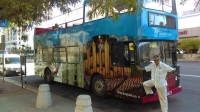Every week I could be sure that at least one would go
Jaroslav Jerry Dolejš was born on January 5, 1953 in České Budějovice into the family of a pastor and preacher of the Czechoslovak Hussite Church. He spent most of his childhood in Kadan, where his father ran a parish. He graduated from Hus’s Czechoslovak Theological Faculty in Prague. He passed the first state exam here in 1974 and due to a lack of clergy, he was immediately entrusted with the parish in Rožďalovice. He was also the new father of the family at the time. In the following years, he gradually began to prepare for emigration abroad, which he planned to undertake during his vacation in Egypt. To obtain an exit clause, he signed a promise of cooperation with the StB, which never occurred due to his escape. In Cairo, he applied to the United States Embassy, which issued an immigration visa for him to Greece and allowed him to fly there a week later. He spent the next two years as an organist with the German Evangelical Church in Athens. In the fall of 1978, he moved to Canada, where he later acquired citizenship. He founded the religious community of the Czechoslovak Hussite Church in Montreal. From 1979 to 1982, he assisted as an interpreter for Czechoslovak emigrants who escaped during a stopover from a plane bound for Cuba. In the first half of the 1980s, however, this line was abolished and interest in Jaroslav’s services gradually waned. In the following decade, therefore, he began doing business in tourism and setting up restaurants in Costa Rica, Arizona and Toronto. In 1995, he returned to the Czech Republic, founded a second family and worked, among other things, as the head of car shipping at Škoda Auto. Today, he lives in Salt Lake City, Utah, United States
